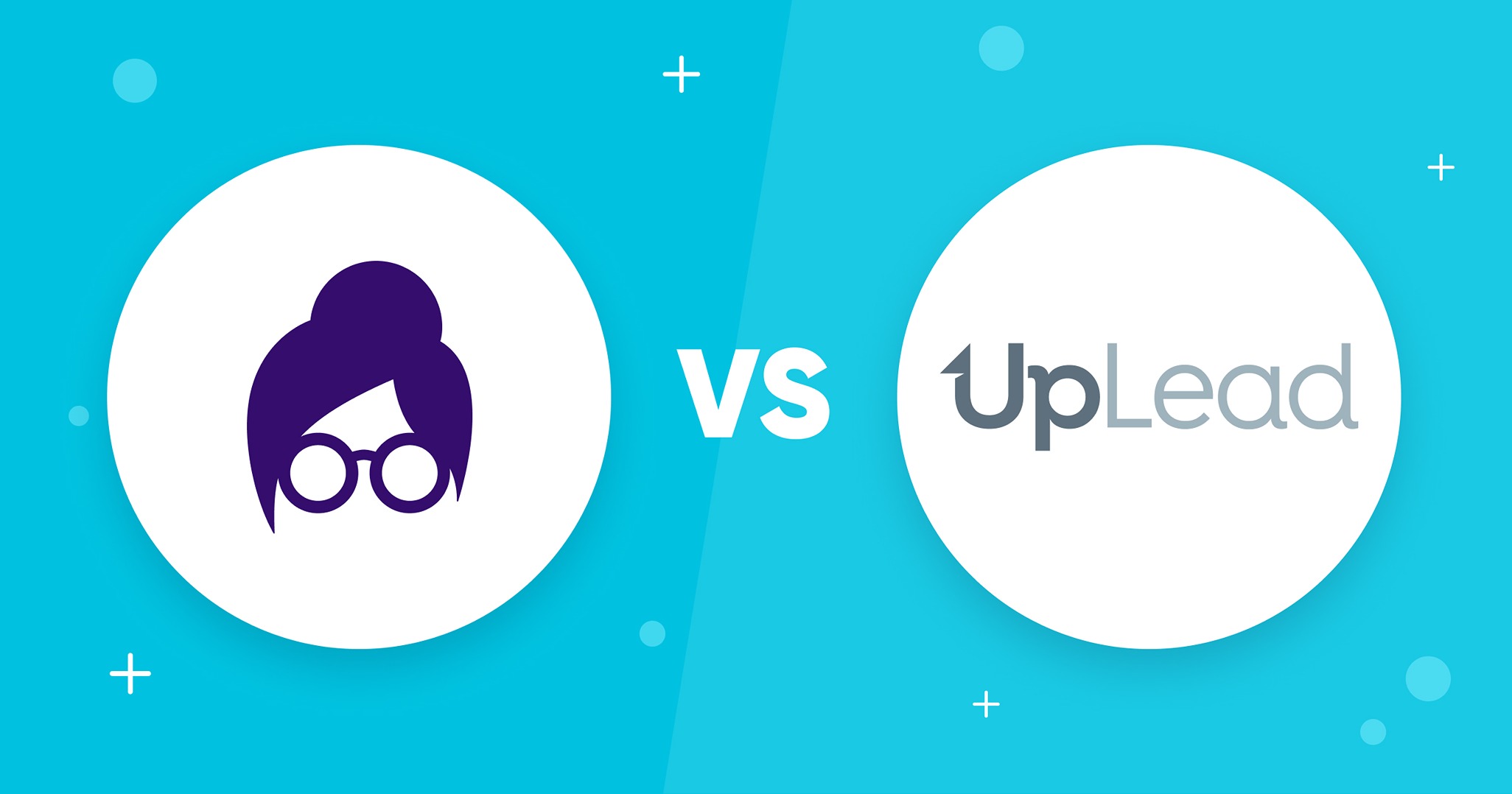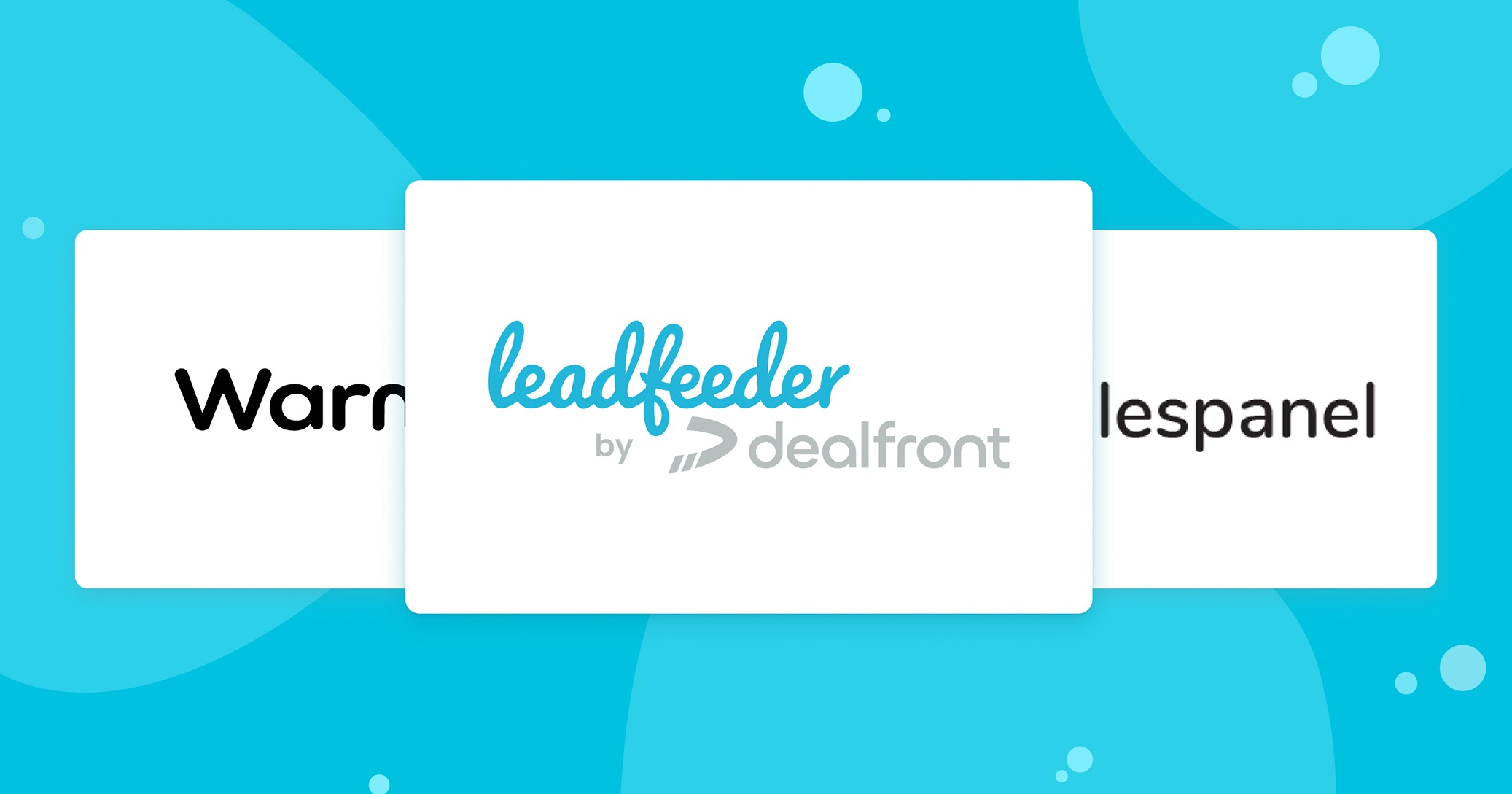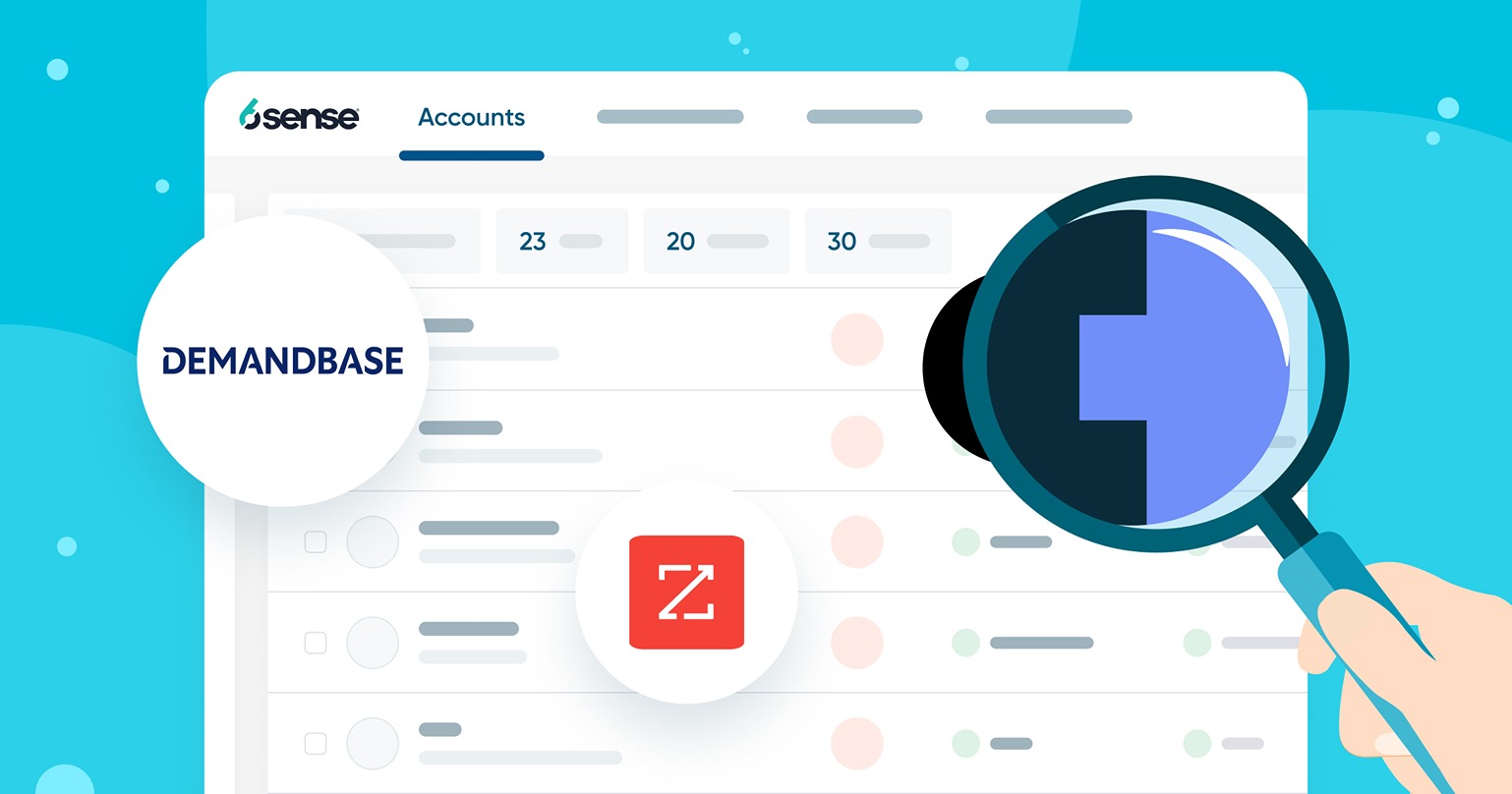Businesses rely heavily on data to drive their sales and marketing efforts. Platforms offering B2B databases have become indispensable for companies looking to identify and engage with high-quality leads.
Two prominent players in this space are RocketReach and Apollo. In this comprehensive guide, we’ll examine each platform’s features, strengths, and weaknesses so that you can make an informed decision about your business needs.
What is RocketReach?
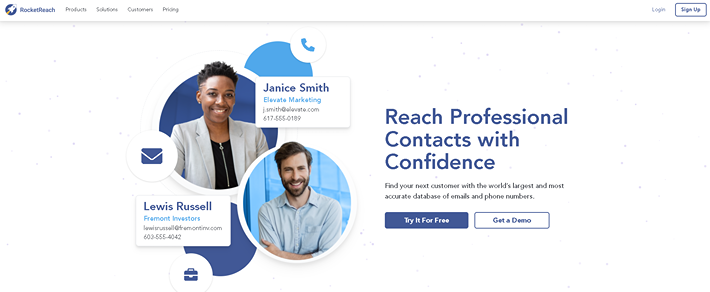
RocketReach is a powerful B2B sales intelligence tool that provides access to a vast database of over 700 million professional and 35 million company profiles. Its primary purpose is simplifying the lead generation process, helping businesses find and connect with potential customers, partners, or candidates by offering accurate and up-to-date contact information.
RocketReach sources its data from various channels, such as web pages, APIs, online profiles, and social media platforms. It vets all its data with advanced algorithms and machine-learning techniques to ensure accuracy.
As a RocketReach user, you can search for specific contacts based on various criteria, such as job titles, industries, company sizes, locations, and more.
RocketReach Pros & Cons
Pros:
- One of RocketReach’s major selling points is its massive database of over 700 million professional profiles and 35 million company profiles.
- It also has a high data accuracy rate of 85%.
- There is an advanced search feature with over 100 search filters.
- RocketReach integrates seamlessly with popular CRM platforms and marketing tools.
- It also has an AI-powered recommendations and insights feature.
Cons:
- One major disadvantage of RocketReach is its expensive subscription plans, which might be unaffordable for many small businesses.
- Though there is a free plan, this is very limiting, as it gives users only five monthly lookups.
What is Apollo?
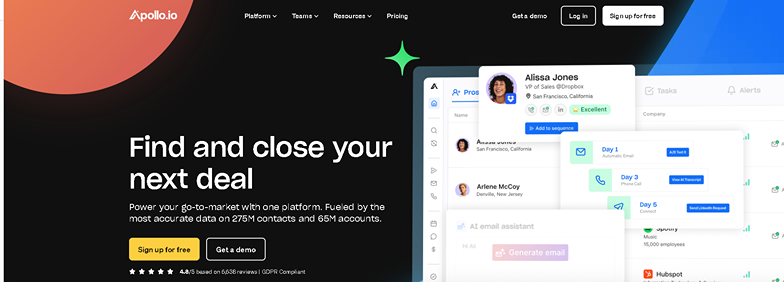
Apollo.io stands out amongst other sales intelligence platforms because it has a more comprehensive function than most. It helps businesses with prospecting marketing and sales activities. With its database of over 220 million global contacts and 30 million companies, it is a valuable resource for businesses seeking high-quality leads.
However, Apollo.io’s strength lies in its ability to streamline the entire lead generation process, from identifying prospects to engaging with them effectively. Its over 200 search filters include firmographic, demographic, and technographic data points, so users can create highly targeted prospect lists tailored to their specific needs.
The platform offers advanced features such as automated sequences, A/B testing, and real-time buying intent data, enabling sales teams to optimize their outreach strategies and close more deals.
Apollo Pros & Cons
Pros:
- Apollo has robust prospecting and engagement features, including automated sequences and A/B testing, which, combined with its database of over 220 million global contacts and 30 million companies, make it a very powerful tool for businesses.
- Apollo users have access to real-time buying intent data, making it easier to identify high-quality leads.
- It integrates well with popular CRM platforms, marketing tools, and messaging platforms like Gmail and Outlook.
- It has fair pricing plans suitable for businesses of all sizes
Cons:
- Some users have raised concerns about data accuracy on Apollo.io.
- The platform offers limited customization options for certain features.
- Some users might find it difficult to learn how to use some advanced features on the platform.
RocketReach vs. Apollo Comparison Guide
RocketReach and Apollo are powerful B2B sales intelligence tools. Being both dedicated to streamlining the lead generation process, they have some common characteristics. Below are the key areas where these platforms differ or are similar.
Key Features
RocketReach and Apollo have key features designed to simplify the prospecting process and enhance sales productivity. While both platforms offer advanced search capabilities and CRM integrations, Apollo stands out with its emphasis on automated sequences, A/B testing, and real-time buying intent data.
RocketReach
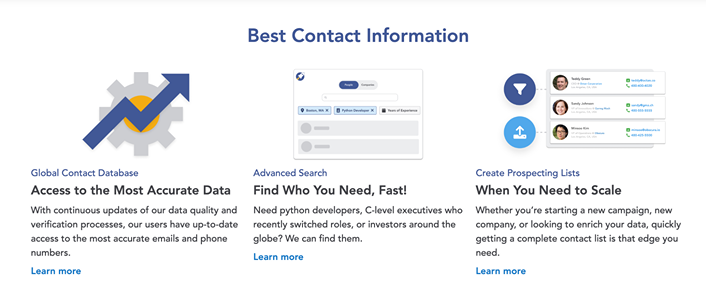
- Advanced Search: Like Apollo.io, RocketReach has an advanced search feature with over 100 search filters, including firmographic, demographic, and technographic data points. It uses AI to provide ultra-specific search results and make profile recommendations to increase your chances of finding the right contact.
- Lists: This is a feature unique to RocketReach. With this feature, users can create contact lists on the platform, making their work quicker and more efficient.
- Intent Data: Evocative of Apollo’s LeadSift feature, RocketReach provides adequate data on potential customers’ purchase intent, making it easier for businesses to find the right fit for them.
- Integration: RocketReach integrates well with other applications. Users can access the platform’s features while using other apps and platforms like LinkedIn, HubSpot, and Salesforce without changing tabs. There is also a Google Chrome extension for seamless integration with web browsing.
- Email Tracking: RocketReach allows users to track emails and measure performance through the “Compose” feature on the platform.
Apollo
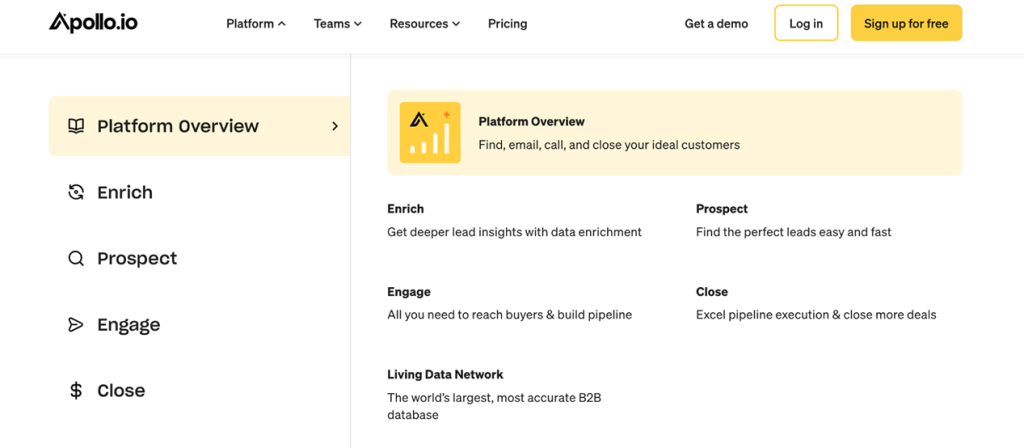
Apollo.io has several valuable features that make searching through its extensive contact database easy. A few are highlighted below.
- Technology Tracking: Apollo users have access to a technology tracking feature that allows them to search through the contact database and find which technologies a company uses.
- LeadSift Intent Data: Like RocketReach, Apollo.io provides users with intent data which increases their chances of finding buyers. It provides enough data to understand potential customers’ purchase intent. This feature, called the LeadSift, alerts you when your prospects are actively searching for the solutions you provide.
- Automated Sequences: Similar to RocketReach’s Lists feature, Apollo.io allows you to create automated sequences of emails, phone calls, and general tasks. This strategic sequencing can help optimize your engagement with prospects.
- A/B Testing: Apollo’s A/B testing capabilities let you test different strategies and optimize your approach to find the best-performing outreach tactics. It also has built-in safeguards, which prevent you from spamming prospects or sending duplicate messages.
Database & Contact Reliability
The reliability and accuracy of the underlying data are critical factors when evaluating B2B sales intelligence tools. Let’s compare the database and contact reliability of RocketReach and Apollo.
RocketReach
RocketReach trumps Apollo.io in database size, with its over 700 million professional profiles and 35 million company profiles. You can find the contact information of just about any business or professional, making RocketReach an incredibly powerful tool.
This data is collected from various sources, such as web pages, APIs, online profiles, and social media platforms. It includes essential information like email addresses (personal and professional), phone numbers (direct dials and mobile), and firmographic data points like annual revenue, number of employees, industry, and location.
There is an 85% data accuracy rate, so you can rest assured that you are getting your prospects’ correct, up-to-date contact information.
Apollo
Compared to RocketReach, Apollo’s database size is limited. It has about 220 million global contacts, including 82+ million outside the United States and 30 million companies. This data is sourced from scraped websites, machine learning algorithms, and a proprietary data network.
Apollo’s data, however, is not the most accurate, as some users have complained about outdated contact info. As compensation, the platform offers a refund on every bounced email.
Integrations & API
Both RocketReach and Apollo can integrate smoothly with other tools and applications. This means you don’t have to be on the platform to have access to their features. Let’s examine each tool’s integration features below.
RocketReach
- CRM Integrations: RocketReach has fantastic CRM integrations that send contact information to users’ CRM databases in real-time. The platform integrates seamlessly with tools like HubSpot and Salesforce, improving businesses’ sales performance.
- Email and Messaging Integrations: Like Apollo, RocketReach also offers email integration with platforms like Gmail, and Outlook. It also integrates well with messaging platforms like Slack.
Apollo
- CRM integrations: Like RocketReach, Apollo also integrates well with CRM platforms like HubSpot and Salesforce. This helps to optimize the sales process.
- Email Integrations: Apollo offers seamless integration with email tools like Gmail and Outlook.
- Marketing Platforms: Apollo has an advantage over RocketReach as it offers integration with marketing platforms like Marketo and SendGrid
- Automation Tools: Another advantage Apollo has over RocketReach is that it integrates well with automation tools like Zapier.
Usability
The user experience and ease of implementation are crucial factors when evaluating B2B sales intelligence tools. This means that we can also compare these two tools based on usability. Let’s see what each tool offers users in this regard below.
RocketReach
RocketReach’s interface is designed with simplicity in mind, making it easy for users to navigate and quickly find the information they need. The platform is relatively straightforward, with browser extensions and CRM add-ins that can be set up within minutes, even for non-technical users.
Apollo
On the other hand, Apollo’s interface is more complex than that of RocketReach. You might need to customize it to your specific use case to be able to find your way around easily. For example, you might map data fields to your CRM or design your custom campaigns for easy navigation.
Chrome Extension
Both RocketReach and Apollo offer Chrome extensions that seamlessly integrate with web browsing, giving you instant access to contact information.
RocketReach
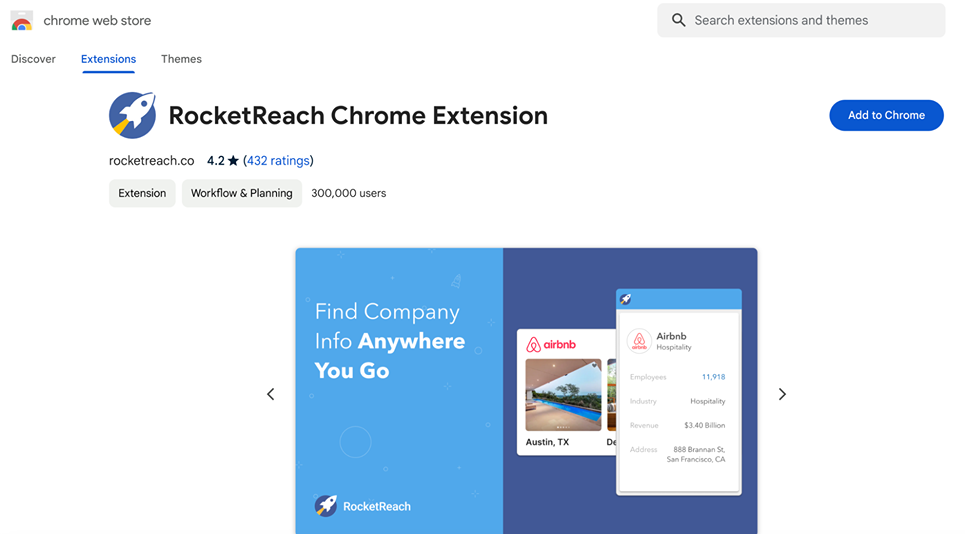
RocketReach’s free Chrome extension surfaces contact information across websites, LinkedIn, and other tools with a single click. With it, you can instantly view full names, email addresses, phone numbers, employment history, and any other available details that RocketReach has on an individual or company.
The extension also allows you to export surfaced data, initiate outreach campaigns, and update CRM records directly from the web.
Apollo
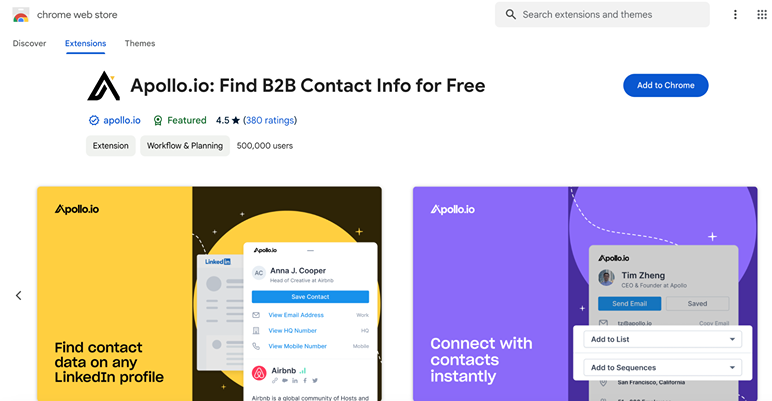
Like RocketReach, Apollo’s Chrome extension allows users to find verified email addresses, direct dials, and mobile numbers effortlessly while browsing the web. It seamlessly integrates with LinkedIn, giving users access to contact information directly from LinkedIn profiles.
Plans & Pricing
Pricing is important when evaluating B2B sales intelligence tools, especially for businesses operating on tight budgets. Let’s explore the pricing structures of RocketReach and Apollo.
RocketReach
RocketReach has four pricing plans, including one free plan and three paid plans. The paid plans are Essentials, Pro, and Ultimate, each unlocking unique features.
- Free Plan: The free plan allows users only five free monthly lookups. You do not need a credit card to use it.
- Essentials Plan: With the Essentials plan, users get up to 80 lookups monthly for $39/month or 1200 lookups annually for $468/year. This plan provides only contacts’ email addresses.
- Pro Plan: The Pro plan allows 200 lookups monthly for $99/month or 36000 lookups annually for $1,188/year. Here, you get both email addresses and phone numbers of prospects.
- Ultimate Plan: This is RocketReach’s most expensive plan, allowing up to 500 lookups monthly for $249/month or 10,000 lookups annually for $2,988/year. This plan covers email and phone.
Apollo
Like RocketReach, Apollo offers four pricing plans, including free and three paid plans.
- Free Plan: Apollo’s free plan gives users access to 600 email credits per year (50 monthly.) There is a daily send limit of 250 emails and other limitations.
- Basic Plan: For $39 per user per month (if billed annually) or $49 per user per month (if billed monthly), users get up to 2,400 email credits per year (200 monthly) on the Basic plan.
- Professional Plan: This plan comes with 600 mobile credits per year (50 per month) and unlimited email credits for $79 per user per month (if billed annually) or $99 per user per month (if billed monthly.)
- Custom Plan: This plan has a minimum cost of $5,000 per year, with unlimited email credits and customized mobile credits.
RocketReach vs. Apollo Comparison Table
Below is a table showing a comparison of the two sales intelligence tools.
| RocketReach | Apollo | |
| Database Size | Over 700 million professionals and 35+ million companies. | Over 220 million global contacts and 30+ million companies. |
| Data Types | RocketReach data includes contact info like names, emails, and phone numbers, and firmographic data points like revenue, employee count, and location. | Also includes contact info and firmographic data points like annual revenue, business type, employee count, location, and so on. |
| Unique Features | Lists, AI-enhanced search, intent data, and so on. | Automated sequences, A/B testing, LeadSift intent data, and so on. |
| Free Trial | 5 free credits, no credit card required. | 600 email credits per year with 250 emails daily. |
| Pricing | Three paid plans: Essentials ($468/year), Pro ($1,188/year), and Ultimate ($2,988/year.) | Three paid plans: Basic ($49/month), Professional ($99/month), Custom ($5000/year.) |
| Chrome Extension | Available in both free and paid plans. | Available in both free and paid plans. |
| Integrations | Integrates with CRMs like HubSpot, email platforms like Gmail, and messaging platforms like Slack. | Integrates well with CRMs, email platforms, messaging platforms and automation tools. |
| Compliance | GDPR, basic data privacy | GDPR, third-party cyber security auditors |
| Target User | Businesses of all sizes and industries. | Businesses of all sizes and industries. |
| Best For | Sales intelligence, lead generation, building prospect lists | Sales intelligence, lead generation, identifying and engaging with prospects |
RocketReach vs. Apollo: The Bottom Line
After an in-depth comparison of RocketReach and Apollo, it’s clear that both platforms offer various rich features and capabilities to streamline the lead generation process. However, the choice between the two may depend on your business needs and priorities.
Choose RocketReach If You Prioritize Simplicity and Ease of Use
RocketReach shines with its user-friendly interface and straightforward implementation process, making it an ideal choice for businesses that prioritize simplicity and ease of use. Its vast database of over 700 million professional profiles and 35 million company profiles, combined with advanced search capabilities and a high data accuracy rate of 85%, makes it a powerful tool for identifying high-quality leads. However, all this might be to little avail if you can’t easily find your way around the platform.
Choose Apollo If You Require Advanced Automation and Engagement Features
If your business requires advanced automation and engagement features to optimize outreach strategies and close more deals, Apollo may be the better choice. Its automated sequences, A/B testing capabilities, and real-time buying intent data empowers sales teams to engage with high-intent prospects effectively.
UpLead is the All in One Alternative
While both RocketReach and Apollo offer compelling features, they have their limits. UpLead makes up for these limits by combining the strengths of both platforms. With an extensive database boasting over 155 million email addresses and 16+ million company profiles, UpLead provides reliable and accurate data with a 95% accuracy rate. This makes it a viable alternative to both tools.
Its advanced search filter feature, real-time email verification, and technographic data tracking make it a powerful tool for finding and engaging with high-quality leads. UpLead’s transparent and affordable pricing structure makes it an attractive option for businesses of all sizes. Users also enjoy a 7-day free trial with 5 credits and a Chrome extension.
FAQs About RocketReach vs. Apollo
Here are some frequently asked questions about RocketReach and Apollo.
Both RocketReach and Apollo are excellent B2B sales intelligence tools. The better choice depends on your specific business needs. RocketReach may be more suitable for businesses prioritizing simplicity and ease of use, while Apollo excels in advanced automation and engagement features.
No, neither RocketReach nor Apollo are Customer Relationship Management (CRM) platforms. They are sales intelligence tools specializing in lead generation, prospecting, and contact data management. However, both platforms offer integrations with popular CRM solutions like HubSpot and Salesforce.
RocketReach and Apollo are used by businesses of various sizes and industries for their lead generation and sales prospecting needs.
What You Need to Remember About RocketReach vs. Apollo
- RocketReach has a larger database with over 700 million professional profiles and 35 million company profiles, while Apollo has around 220 million global contacts and 30 million companies.
- RocketReach is praised for its user-friendly interface and ease of use, while Apollo has more advanced features like automated sequences, A/B testing, and real-time buying intent data.
- RocketReach’s pricing plans are generally more expensive than Apollo’s, especially for small businesses.
- UpLead is a great alternative combining the strengths of RocketReach and Apollo into one comprehensive sales intelligence solution.

